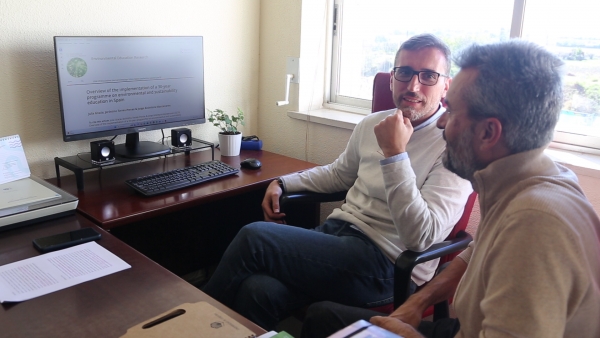Environmental Education for Sustainability seeks to transform the practices of school communities by developing the skills needed to address the environmental, social and economic challenges facing humanity.
In Andalusia, the Aldea program is the environmental education tool with which these objectives are pursued. For 30 years this program has been implemented at more than 1,000 schools, with the purpose of promoting a more democratic, just and sustainable society, connecting the educational community with nature, and developing ecosocial qualities to respond to the current climate emergency. The schools are integrated into the program by becoming Ecoschools, or launching recycling programs, fights against climate change, or ecogardens.
Despite its long history, the program lacked an academic/scientific evaluation. Therefore, a team from the Department of Specific Didactics at the University of Cordoba, formed by researchers Julia Gracia, Jorge Alcántara and Jerónimo Torres, has published an "X-ray" of Aldea's implementation of Aldea from the perspective of the pedagogical coordination team.
"We held focus groups with 13 coordinating teachers of the program in all the Andalusian provinces to learn about their beliefs regarding the program and their views on its impact, but also on the barriers they encounter, and opportunities for improvement," explained researcher Jorge Alcántara.
Drawing on this qualitative analysis, carried out based on opinions of those who coordinate the program's managers at the different schools, "the program must adopt a comprehensive approach(whole–school approach) to environmental education for sustainability " said researcher Julia Gracia. This means that the entire school is involved, that both students and teachers become agents of change, and that the implementation of environmental education for sustainability is included in the school's curriculum. According to Gracia, it is essential to "encourage collaborative work and networking, making the most of the school's own resources and its environment, and maximizing its positive impact, which, in turn, will create a sense of shared responsibility in the community."
In this way, it would address one of the problems that have been detected in this evaluation: the fact that, in many cases, the entire burden of the program falls on one teacher, who is, thus, overloaded with work, followed by negative impact that this can entail if the teacher changes schools. In fact, "the teachers also stressed the feeling of burnout that many of the plan's coordinators feel at the school when it is not integrated in a transversal way, and all the work falls on one person," said Jerónimo Torres. More training, and the recognition of specific time to dedicate to the program, are also some of the needs pointed to by teachers. "What is relevant is the motivation of those people in charge of coordination," people who are committed to this type of education, which bears fruit: "the Aldea program contributes to improving student awareness and preparing them to face current and future challenges, such as the climate crisis, and adapt," Gracia said.
According to Jorge Alcántara, the study found that another way to get the most out of the program, is to put students at the center, adopting an emancipatory approach so that they are able to get involved in sustainability, in general, and that of the school, in particular."
The evaluation of these programs makes it possible to ascertain, with scientific evidence, the strong points, to enhance them, and the problems that need to be addressed, especially in an action like this, which, for the researchers, "is absolutely essential."
This study, which is the result of the doctoral thesis of researcher Julia Gracia, will continue with another evaluation gathering the opinions of all the teachers who have worked in the Aldea program in some way. The conclusions will allow us to trace action paths that improve the program and move towards a society that places environmental conservation at the center.
Reference
Julia Gracia, Jerónimo Torres-Porras & Jorge Alcántara-Manzanares (2023) Overview of the implementation of a 30-year programme on environmental and sustainability education in Spain, Environmental Education Research, DOI: 10.1080/13504622.2023.2252623


